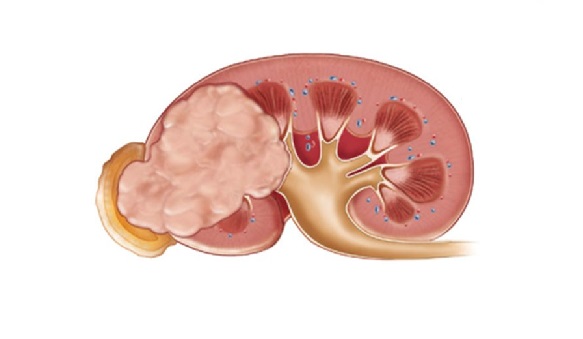Radical nephrectomy
Defintion
 By nephrectomy is the removal of the kidney, the perirenal fat and the fascia of Gerota (external sheath which surrounds the kidney); if the disease also involves the upper pole of the kidney, nephrectomy may also include removal of the adrenal gland.
By nephrectomy is the removal of the kidney, the perirenal fat and the fascia of Gerota (external sheath which surrounds the kidney); if the disease also involves the upper pole of the kidney, nephrectomy may also include removal of the adrenal gland.
Nephrecrotism total is usually required in case of kidney cancer. If in the past surgery was performed in the open, that is to say through an abdominal incision, today nephrectomy is increasingly performed in a minimal way, thanks to robotic surgery.
The operation
Total nephrectomy involves ligating and cutting the renal vessels (vein and artery), gonadal vessels, and ureter. At the end of the intervention, a drainage is placed in the renal lodge which brings out any residual blood lymph or urine and which is generally removed after 2-3 days after the intervention.
Nephrectomy surgery can last from 90 to 180 minutes and the postoperative stay should be limited to the shortest possible time to reduce the risk of contracting hospital infections. The average hospital stay is about 3 to 4 days depending on the surgical approach.
the technique is based on the use of the laparoscope, a thin and flexible tube that allows the surgeon to closely observe the structures of the abdomen and to intervene on the tumor by making a few small incisions on the abdominal wall ( usually 4 or 5), through which they are presented with the operating tools of the surgeon and the camera operated by the assistant. This surgical technique has the advantage of leaving very small scars and therefore of having a fairly short recovery time.
After the surgery
The patient is encouraged to get up and walk around as soon as possible. A drainage tube is likely to be applied to the wound, which is removed a few days after the procedure. However, you can go home even if the drain is still in place.
Length of hospital stay depends on the surgery you had; it is usually between 3 and 4 days after robotic or laparoscopic surgery and around 7 to 10 days after a traditional nephrectomy operation. However, any complication prolonging the duration of hospitalization cannot be excluded a priori.
In the first days of the postoperative period, it is normal to feel pain or discomfort around the wound, which may persist for a few weeks. To control the pain, pain medications will be given (usually intravenously). If the pain does not improve, the patient should inform the nursing assistant as soon as possible, or the attending physician if he has already been discharged, so that they can prescribe more effective analgesics and/or the necessary investigations. .
The area around the wound appears bruised and swollen for a while due to blood or lymph buildup, but these marks gradually disappear over a few weeks. Sometimes medical personnel may need to perform a drainage. It's a rare and unpleasant occurrence, but even that tends to go away over time, usually within a few weeks.
At the time of the exit, the appointment for the control is fixed. On this occasion, the doctors inform the patient of the diagnosis and the stage of the tumor and the possible need for additional treatments. This is a good time to discuss any problems that might arise after the surgery, treatments the patient will need to undergo, and possible side effects.
Once at home, the patient must take care of himself for a while, rest to recover his physical and psychological energies and follow a balanced diet. Self-care also includes avoiding stressful physical activities or excessive physical exertion (such as lifting weights) during the time necessary for recovery.
Alternatives to surgery
To choose the most appropriate therapy (or combination of therapies), the physician considers several factors:
The site where the tumor formed.
The stage of the tumor i.e. the thickness and possible spread to the lymph nodes lymphatics and organs more or less close to each other.
The rate at which the tumor is growing.
The general state of health of the patient and the presence of concomitant medical problems.The different therapeutic strategies for the treatment of kidney cancer are essentially defined according to the stage of the disease. The standard treatments currently used are surgery, immunotherapy, chemotherapy and radiotherapy.